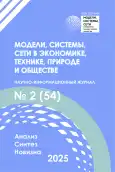REVERSE ENGINEERING OF INTRAVASCULAR CATHETERS
- Authors: Kartashova E.D.1, Muyzemnek A.Y.1
-
Affiliations:
- Penza State University
- Issue: No 2 (2025)
- Pages: 122-133
- Section: MODELS, SYSTEMS, MECHANISMS IN THE TECHNIQUE
- URL: https://journal-vniispk.ru/2227-8486/article/view/307586
- DOI: https://doi.org/10.21685/2227-8486-2025-2-10
- ID: 307586
Cite item
Full Text
Abstract
Background. The creation of competitive products is the main task of various branches of industrial production. The solution of these problems is possible due to the use of polymer layered composite materials. An example of their use in medicine are intravascular catheters, the tubes of which consist of several polymer layers that alternate with layers of metal mesh or fabric. The relevance of the work is due to the fact that in order to create new competitive intravascular catheters, it is necessary to have a complete understanding of the design and physical and mechanical properties of composite materials of well-proven intravascular catheters of competitors. The purpose of the work is to determine the design and physical and mechanical properties of composite materials of diagnostic and guiding intravascular catheters. Materials and methods. The subjects of the study were intravascular catheters with a polymer-metal composite tube based on a nylon matrix and stainless steel reinforcement. Such tubes have both diagnostic and conductive intravascular catheters. Original methods for measuring the sizes of intravascular catheters, including the sizes of the metal braid, determining the bending rigidity of the catheter at different temperatures, including the thermocycling mode and holding at a constant temperature, have been developed and used. Results. A sequence of reverse engineering of intravascular catheters containing tubes made of polymer-metal composite materials has been developed, the characteristics of the physical and mechanical properties of the composite components and its engineering constants have been determined. Conclusions. The developed sequence of reverse engineering of polymer-metal composite materials allows to determine the characteristics of the physical and mechanical properties of the composite components and its engineering constants.
About the authors
Ekaterina D. Kartashova
Penza State University
Author for correspondence.
Email: katrina89@yandex.ru
Candidate of technical sciences, assistant of sub-department of theoretical and applied mechanics and graphics
(40 Krasnaya street, Penza, Russia)Alexander Yu. Muyzemnek
Penza State University
Email: muyzemnek@yandex.ru
Doctor of technical sciences, professor, head of sub-department of theoretical and applied mechanics and graphics
(40 Krasnaya street, Penza, Russia)References
- Tarkhanova A.R., Muyzemnek A.Yu. Investigation of the bending stiffness of polymer layered composite structures under static loading. Aktual'nye problemy nauki i obrazovaniya: sb. nauch. st. po materialam Mezhdunar. nauch.-prakt. shkoly = Actual problems of science and education : collection of scientific articles based on the materials of International scientific and practical school. Penza: Izd-vo PGU, 2024:161–164. (In Russ.)
- Tarkhanova A.R., Kartashova E.D., Muyzemnek A.Yu. Calculation of the bending stiffness of polymer layered composite structures during bending tests. Sbornik statey XI Vserossiyskoy nauchno-tekhnicheskoy konferentsii molodykh uchenykh i studentov s mezhdunarodnym uchastiem = Collection of articles of the XI All-Russian Scientific and Technical Conference of Young Scientists and students with international participation. Penza: Penzen. gos. agrar. un-t, 2025:281–283. (In Russ.)
- Tarkhanova A.R., Kartashova E.D., Muyzemnek A.Yu. Investigation of the effect of temperature on the bending stiffness of polymer layered composite tubes. Sbornik statey XI Vserossiyskoy nauchno-tekhnicheskoy konferentsii molodykh uchenykh i studentov s mezhdunarodnym uchastiem = Collection of articles of the XI All-Russian Scientific and Technical Conference of Young Scientists and students with international participation. Penza: Penzen. gos. agrar. un-t, 2025:284–287. (In Russ.)
- Digimat 2023.1 MF User’s Guide.
- Mori T., Tanaka K. Average stress in matrix and average elastic energy of materials with misfitting inclusions. Acta Metallurgica. 1973;(21):571–574.
Supplementary files





















